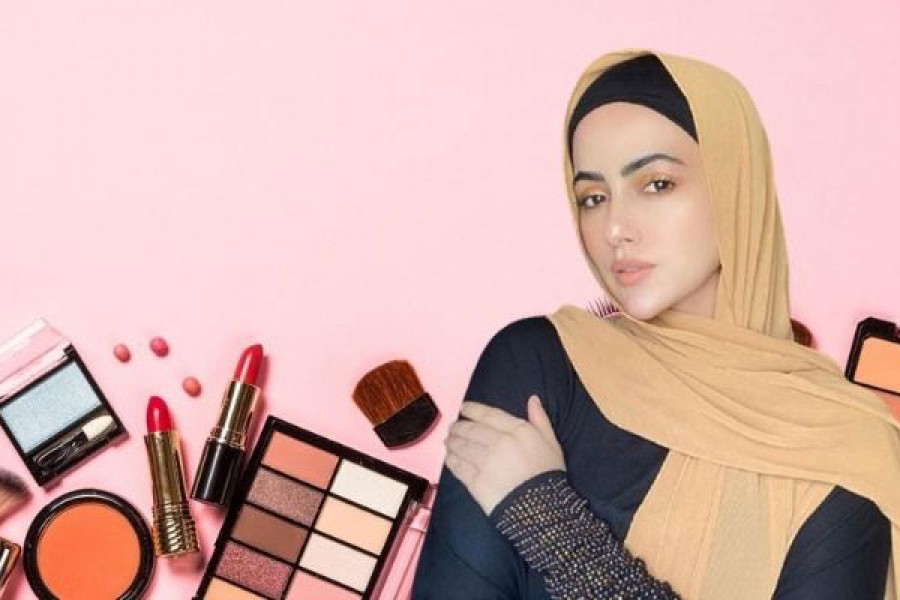The term ‘halal’ has commonly been associated with Islamic dietary laws and food. But who could’ve thought that this term will become beauty’s latest buzzword and connote a blend of beauty and faith?
Who could’ve thought that halal certification on foundation, lipstick or even contour powder will create an extra appeal among Muslim consumers?
The rising sale of halal products shows that Bangladesh is ready to cash in Islamic branding, with many companies beginning to cater to the rising demand for such products in the country.
Ingredients that do not contradict faith
Many Muslim beauty product users are often shocked to find that many of their cosmetic and skincare staples are hiding haram (not permissible by Islam) ingredients.
Some of them contain ingredients that don’t allow water to penetrate into the skin — thus hampering the completion of ‘wudu’ (ablution) before praying. So when Muslim consumers find halal beauty products that are safe to use, they feel comfortable switching from non-halal brands.
Halal cosmetics are manufactured by using ingredients that are permissible according to Islamic Sharia law.
It encompasses everything from the ingredients, manufacturing, packaging and storage that are free from and do not come into contact with a pig, carnivore or blood-based ingredients, alcohol and their by-products that are considered haram.
This practice also ensures that the products are processed with instruments that have not been contaminated with impurities.
Some consumers may confuse halal with vegan. However, not all halal beauty products are vegan as some contain other animal derivatives like beeswax and honey.
Popularity on the rise in Bangladesh
The halal cosmetics market is driven by the increasing Muslim population — which now accounts for over a fifth of the global population. With the younger generation emerging as more conscious consumers, halal products are on the verge of going mainstream.
And Bangladesh was the sixth largest Muslim cosmetics market, according to a report by Thomson Reuters, titled - ‘State of The Global Islamic Economy 2016/17.’
It showed that the estimated size of Muslim consumers’ cosmetic spending in Bangladesh was US$2.5 billion in 2015. At present, a significant share of the non-Muslim population is also shifting towards halal beauty products as they symbolise safety, cleanliness and hygiene.
Global brands who promote halal products
The increasing demand for halal beauty products has led to a subsequent rise in the number of halal-certified beauty brands in the country.
Lafz is an example of such a brand that has seen a lot of sales through influencer marketing since its launch in 2019. Products of Lafz such as water-permeable and ablution-friendly nail polish and non-alcohol body spray are reliable names of halal cosmetic buyers.
Another example is the Indonesia-based halal cosmetics brand Wardah, which has recently been introduced in the Bangladeshi market. The brand is certified with GMP (Good Manufacturing Practice) and HAS (Halal Assurance System). Their ablution-friendly nail polishes have already gained immense popularity.
Consumers still sceptical
Farhana Preeti, Head of Business Development at retail chain cosmetics shop ‘Shajgoj,’ opines, “Although promotional activities by several brands spread the word, many consumers are still not aware of halal beauty products. And those who’ve heard about halal brands, take their value proposition with a pinch of salt.”
On top of that, many consumers find the products to be overpriced — compared to traditional options.
“At Shajgoj, we frequently get questions from customers asking whether halal products are actually wudu-friendly,” Farhana shares.
She thinks customers have significant doubts regarding the whole halal certification thing. And they find it irrational to pay such a high price for products that they’re not even sure about.
The marketing of halal cosmetics is so far limited within the online market periphery — including e-commerce and social media platforms. Traditional companies still offer better prices and variety, and consequently, dominate the market.
BSTI certification will lead the popularity rise
But recently, Bangladesh Standards and Testing Institution (BSTI) has announced to issue halal certification for processed foods and cosmetics — in line with Islamic laws. This step will encourage new beauty brands to come forward and seize the opportunity of reaching out to the fast-growing Muslim population.
The idea of ‘100% halal soap’ had once taken the Bangladeshi market by storm. In the same way, there is a huge scope of success for halal beauty brands in the country.
Farhana believes, “Halal-certified companies can build a better brand story by focusing on the skin benefits that any consumer, regardless of faith, can avail from the wide range of products they offer.”
Such an approach, she hopes, will help these companies to be more inclusive and appeal to not only Muslim consumers but non-Muslim counterparts as well.
But before anything else, Farhana recommends, “Halal brands should come forward and provide solid evidence that proves their products are, in actuality, wudu-friendly.”
Because they should understand that “A single halal certificate isn’t enough to convince people of something that’s so closely attached to their religious sentiments,” she concluded.


